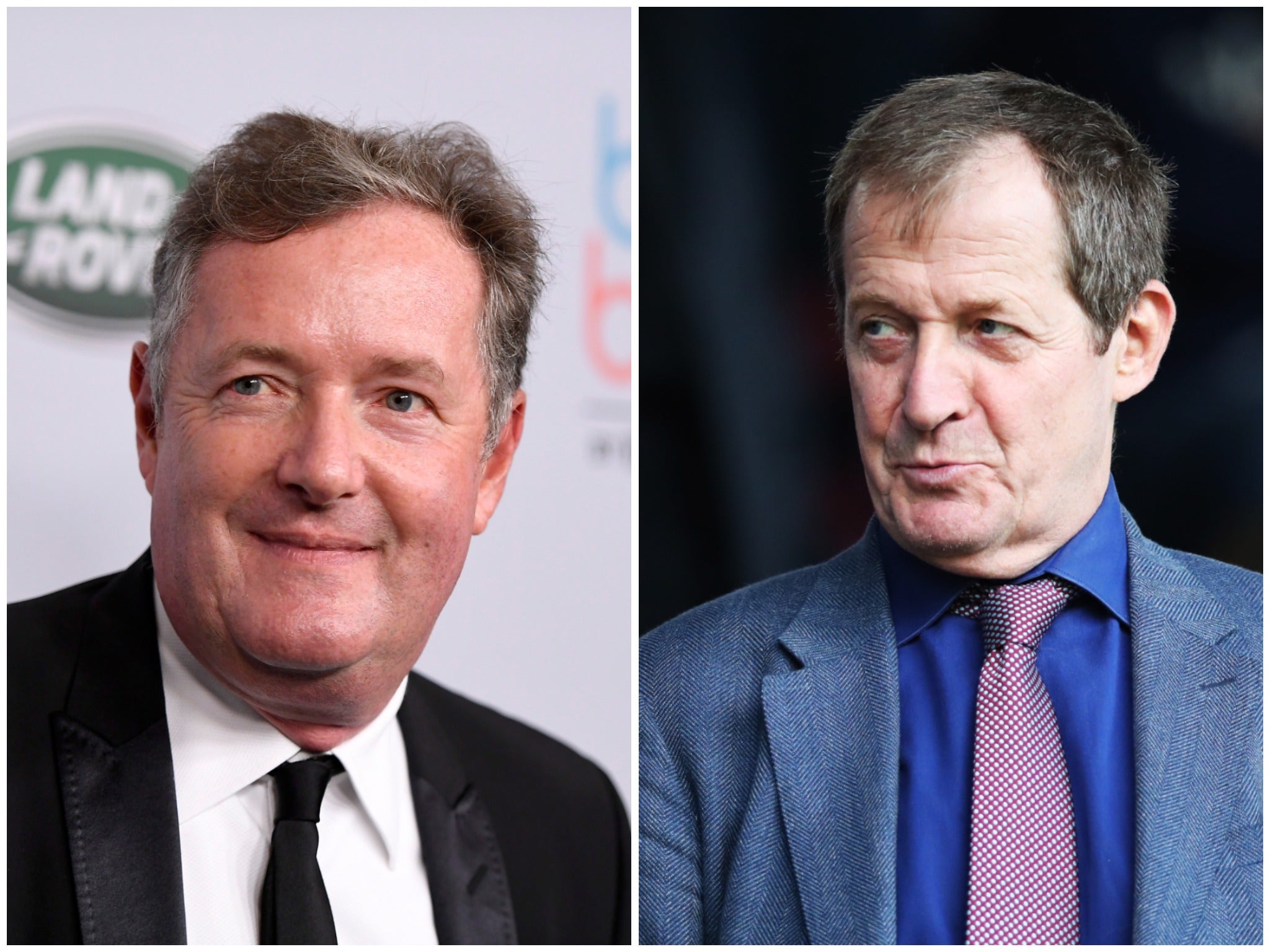The Good Morning Britain door closing on Piers Morgan has opened a new one for me
My hosting stint is proof that you are never too old to do something different. One of the things that attracted me was having to brush up on topics that take me a bit out of my comfort zone.


Your support helps us to tell the story
From reproductive rights to climate change to Big Tech, The Independent is on the ground when the story is developing. Whether it's investigating the financials of Elon Musk's pro-Trump PAC or producing our latest documentary, 'The A Word', which shines a light on the American women fighting for reproductive rights, we know how important it is to parse out the facts from the messaging.
At such a critical moment in US history, we need reporters on the ground. Your donation allows us to keep sending journalists to speak to both sides of the story.
The Independent is trusted by Americans across the entire political spectrum. And unlike many other quality news outlets, we choose not to lock Americans out of our reporting and analysis with paywalls. We believe quality journalism should be available to everyone, paid for by those who can afford it.
Your support makes all the difference.Many years ago, as a young general news reporter, I covered the early days of TV-am. It was a huge story for tabloids and broadsheets alike. For the broadsheets, independent morning news TV represented a major shake up in the media and business ecosystem busy transforming itself into something unrecognisable from the media world we grew up in.
For tabloids like The Mirror, we had a daily diet of stories about some of the biggest names in TV – the “Big Five” presenters David Frost, Michael Parkinson, Anna Ford, Robert Kee and Angela Rippon.
A pack of us based ourselves in the Oxford Arms in Camden Town, running out whenever we saw the photographers leap into action.
A few years later I got my own taste of breakfast television when the BBC asked me to do a regular review of the newspapers. It was very different from the modern press review, in which pundits leaf through the papers as the front pages go up on screen. It was more based on the old What the Papers Say model, literally cutting pieces out of papers, composing them as graphics and trying to construct a narrative for a longish piece to camera.
I enjoyed it, not least because I was allowed pretty much free rein to select headlines and stories that suited my own interests and agenda, knowing others with very different views would be allowed to do likewise on other days. I am sure some viewers found my review about high flying Blackburn Rovers losing a European tie to a lowly Norwegian team called Trelleborgs a bit baffling but hey, it was a great day for a Burnley fan.
It was also good to work alongside professional presenters like Jill Dando, one of the nicest people I ever worked with, and Nick Witchell, still going strong back on the Royal beat. I loved talking football too with Bob Wilson, an early example of ex-player turned presenter and pundit. And I loved the make-up team, especially Marilyn who knew of my sweet tooth and had a steady supply of my favourite white toblerone.
By 1994 I was an established regular and the powers that be were sounding me out about possibly quitting newspapers and moving into TV presenting. My instinct was that I was too politically committed to Labour and I knew that while I could get away with a bit of bias on a paper review I would have to be very different in one of the main chairs. But I said I would mull it and meanwhile carry on doing the papers, as well as making a series of political profiles.
As part of the possible transition to a different role Breakfast asked me to be on a panel, with Justin Webb and Matthew Parris, interviewing the contenders to replace John Smith, Margaret Beckett, John Prescott... and Tony Blair. I asked him if he was tough enough for the job, and what skeletons he had that could damage him. I asked him to justify why he felt he could be a PM.
At that point we had not discussed my working for him. But when he won, we did, and after a month of even more intense mulling than I was devoting to the question of working for the BBC, I agreed to join him. A career defining and life changing decision. One that I made in the face of intense opposition from my partner and my parents and from Neil Kinnock who told me I would hate it, who said too that I could be “the next Paxman, the next Parkinson, whatever I wanted”. Well, who knows. Because I went the other way.
Apologies for the long historical pre-ramble but it did feel like I was revisiting unfinished business when I sat in one of the two main chairs on the set of Good Morning Britain this week, rehearsing after agreeing to guest present in mid-May. Perhaps that feeling was especially strong because Good Morning Britain is broadcast from TV Centre. I have been on the show many times as a guest but presenting is very different from being there as a pundit or political combatant, or talking about myself, my books, campaigns or other projects.
In recent years the chair has been most famously filled by Piers Morgan, like me something of a marmite figure, with an up and down career summed up well in his own Twitter bio: “One day you’re the cock of the north, the next you’re a feather duster.” There can be few people in Britain unaware of how his tenure ended, his storm out amid the controversy over his remarks about Meghan Markle.

So in agreeing to step in, I did so knowing I have neither the presenting experience nor the sheer love of “being on telly” to want to be known as “the next Piers Morgan”.
The truth is I love the freedom in my post political life and the idea of dragging myself out of bed in the middle of the night fills me with dread. But when ITV asked me to guest present alongside Susanna Reid, and I realised the dates coincided with Mental Health Awareness Week, I thought perhaps it was meant to be.
Fear not, there will always be the news, views, interviews, competitions, the light stuff amid the heavy and one of the things that attracted me was having to brush up on issues that take me a bit out of my comfort zone. But Good Morning Britain has been among the best on the mental health front down the years, in terms of breaking down stigma, so I hope we can do something big on the issue each of the three days I will be there.
I am also looking forward to interviewing politicians on all sides. My week is the one following the local elections so even without Covid-19 and the continuing controversy over funding and flats, the political scene will be hot. One of the most important elements of our democracy is that ministers and their shadows should be subject to scrutiny and questioning and I thought it was self-defeating for the government to have their long boycott of certain programmes, including Good Morning Britain.
Ministers should never fear robust questioning but I also know how much most people hate it when things descend into squabbles or shouting. And though I may have strong views, I also think one of the worst things about the nature of our debate, exacerbated by social media, is that we don’t want to engage properly with people who have different views.
Indeed the social media reaction to the news of my stint underlined that. People who like me were happy and told me I was just what it needed. People who hate me were furious, worst mistake ever made by ITV, and all the old jibes come trolling out. Here’s the thing though – I like talking to both!
And on the question for the need for light and shade in our debate the thing that has perhaps been troubling me most is how to get the balance right between presenter, a role I am not very used to, and combatant, something I am used to being. Well, that and missing my 7am cold water swim, and the fact that I am booked to do the co-commentary for the Fulham v Burnley game – kick off 8pm – on one of the nights I will be setting the alarm for 4am.
I wonder if Piers is around. He fancies himself as a football pundit, is probably bored by now, and I could maybe watch it on telly, in bed.
Alastair Campbell is a British journalist, broadcaster, political aide and author, best known for his work as director of communications and strategy for Prime Minister Tony Blair between 1997 and 2003
Join our commenting forum
Join thought-provoking conversations, follow other Independent readers and see their replies
Comments